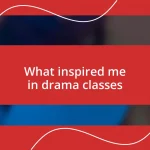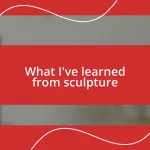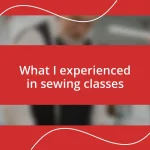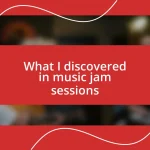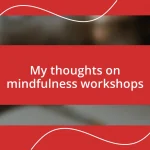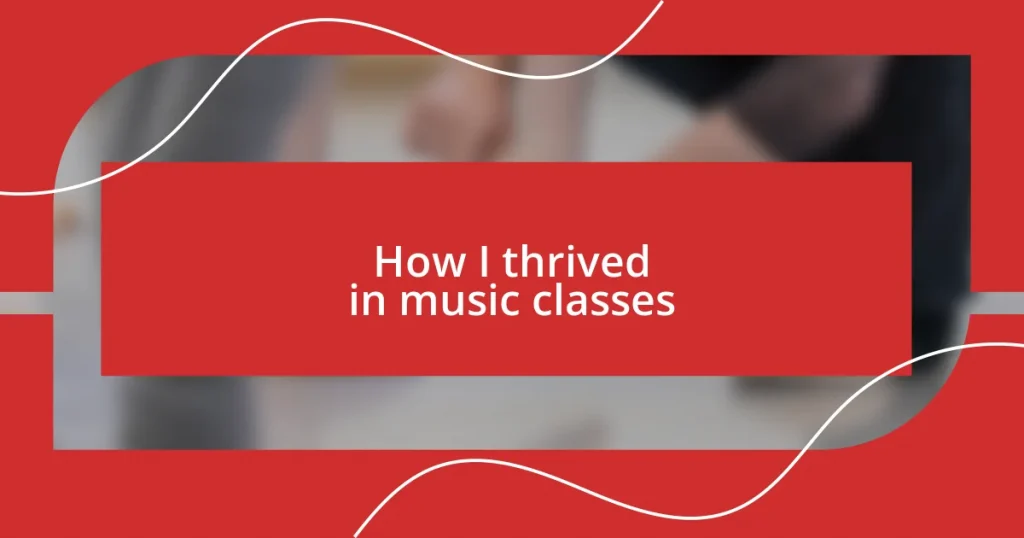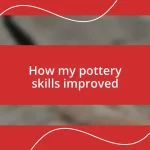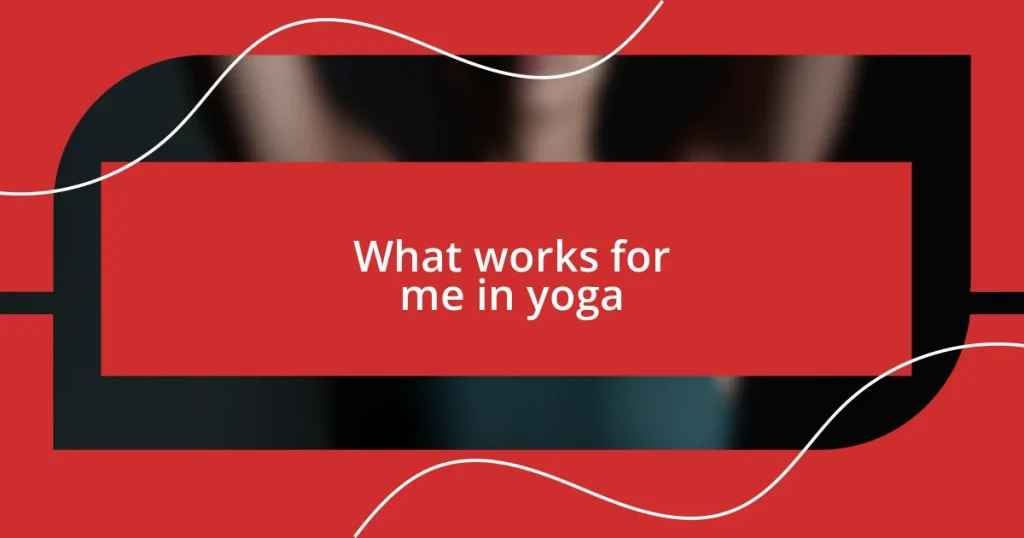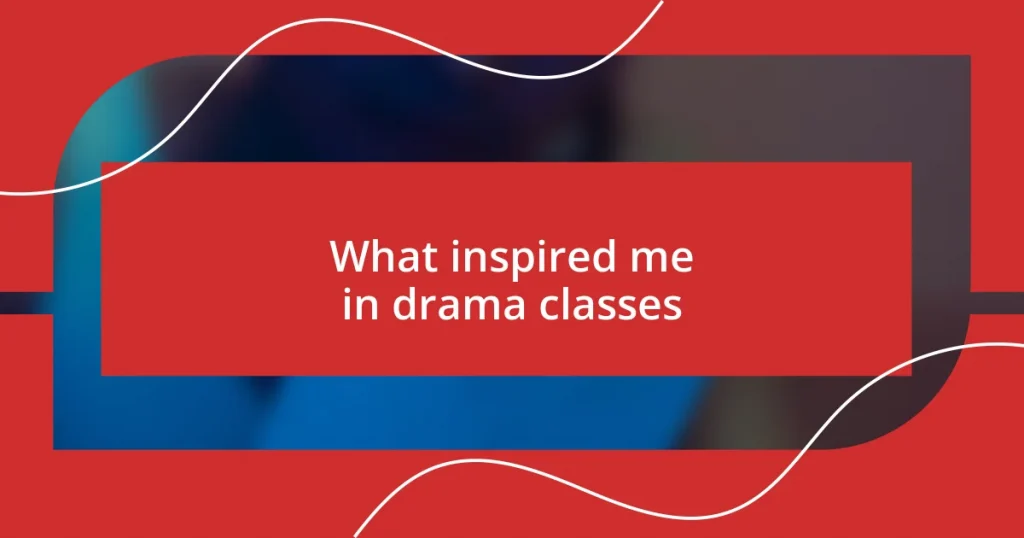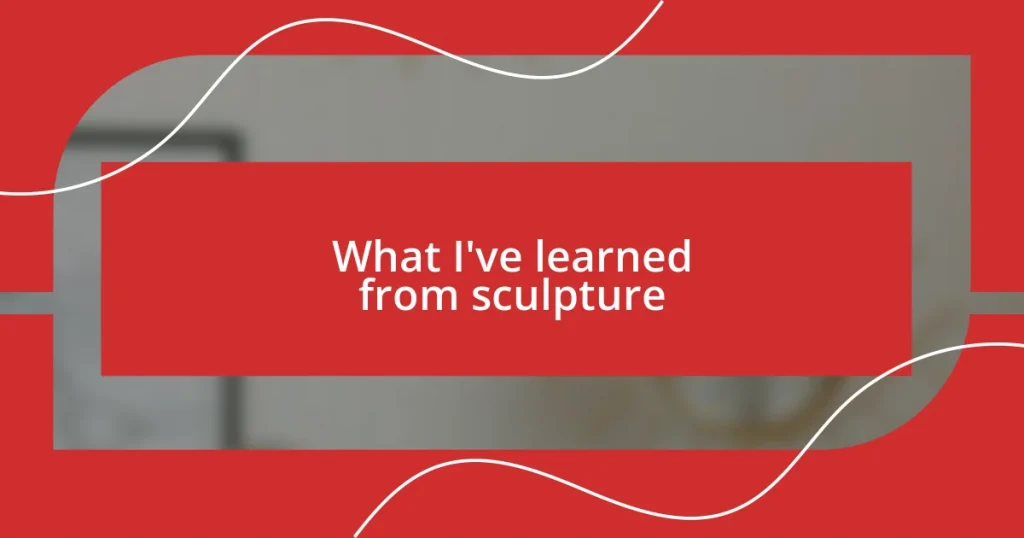Key takeaways:
- Initially focused on technical skills, the author’s goals evolved towards artistic expression and storytelling through music.
- Engaging with classmates and instructors fosters a supportive learning environment, enhancing creativity and confidence.
- Embracing feedback and celebrating small achievements are essential for growth and motivation in musical development.
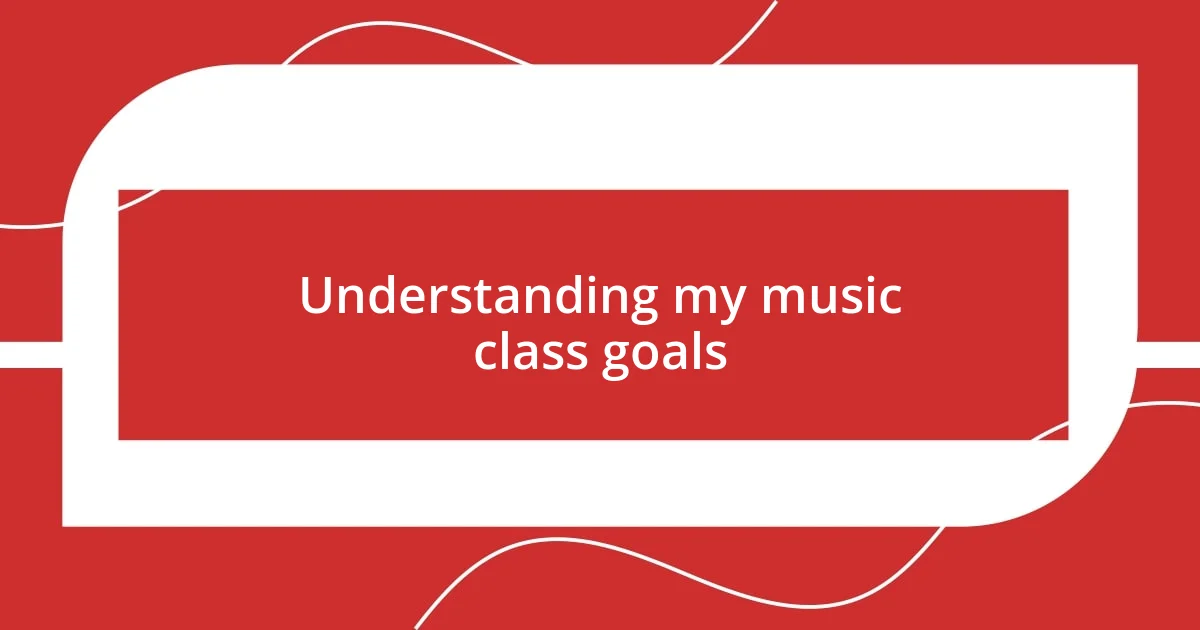
Understanding my music class goals
When I first joined my music class, I had a simple goal: to improve my skills. But as I progressed, I realized that my objectives needed to evolve. Have you ever found yourself setting a goal only to discover it wasn’t quite what you really needed? That was me; I began to see that my true ambitions went beyond just technical proficiency.
One pivotal moment for me was when I performed in front of my classmates for the first time. I remember my heart racing, nerves bubbling just below the surface. It hit me then—connecting with an audience was just as important as mastering an instrument. Isn’t it interesting how a simple performance can shift your focus from self-improvement to the powerful impact of music on others?
As I delved deeper into my classes, my goals transformed into a blend of artistry and expression. I started aiming not only to learn notes and rhythms but to tell a story through my music. Reflecting on this journey makes me wonder: how often do we allow our initial ambitions to grow and change? Embracing this evolution in my goals has shaped my musical identity, encouraging me to explore new genres and styles.

Finding the right music class
Finding the right music class is crucial for your development as a musician. I vividly remember the time I walked into a class filled with relentless energy, all students passionately strumming their guitars. I felt an electric connection—the teaching style resonated with me, and it was clear I had found my place. Think about the specifics: Are you drawn to group dynamics or do you prefer one-on-one mentorship?
Here’s a checklist to consider when selecting the right music class:
- Teaching Style: Do they focus on technique, theory, or creativity?
- Class Size: Smaller classes often provide more personalized attention.
- Genre Focus: Make sure the class aligns with your musical interests.
- Experience Level: Confirm that the class matches your skill level to avoid frustration.
- Location and Schedule: Ensure it fits into your routine comfortably.
Once I aligned my needs with the right class, my passion thrived. The support and resources available in that environment were exactly what I needed to flourish.
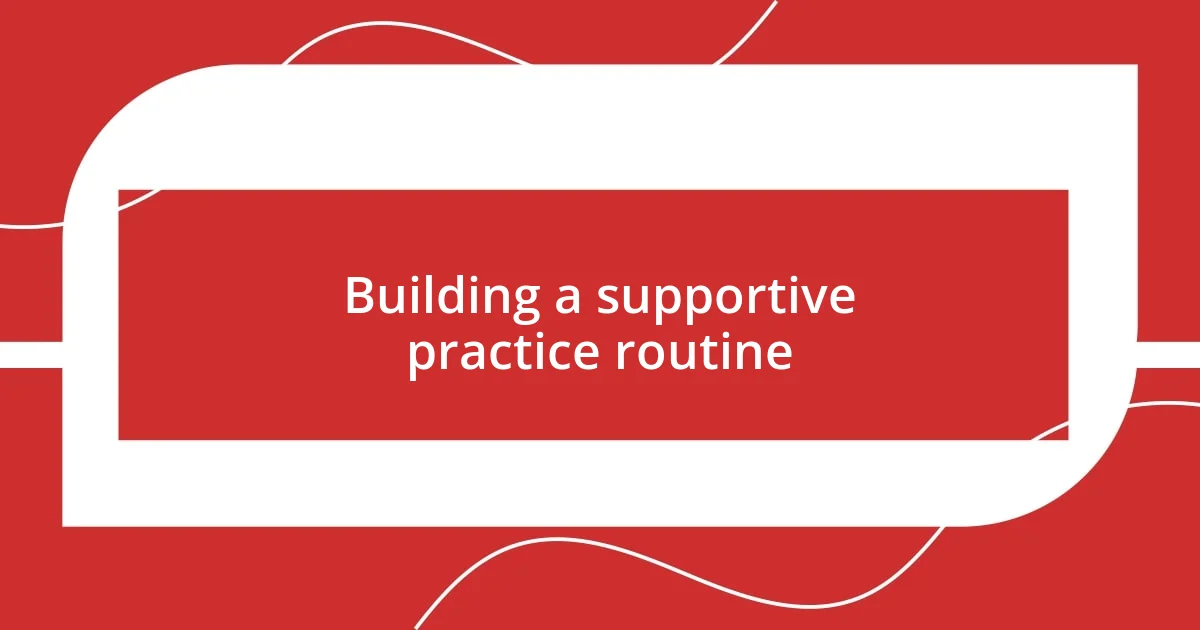
Building a supportive practice routine
Building a supportive practice routine can be transformative for your growth as a musician. I remember the early days of practicing, feeling overwhelmed by the sheer volume of material to learn. One day, I decided to structure my practice sessions into manageable segments. By focusing on specific skills each day—like scales one day and song interpretation the next—I found it easier to track my progress and stay motivated. Have you ever considered how breaking down your practice could change your outlook on learning?
Creating a nurturing environment is equally important. I made it a point to practice in a space that sparked joy. Whether it was lighting a candle or arranging my sheet music for easy access, these small changes made a significant difference. I felt more inspired to pick up my instrument daily. Imagine how much more enjoyable your practice time could be if you tailored the space to fit your personality!
As I advanced, I learned that accountability rocked my practice routine. I couldn’t always rely on motivation alone; sometimes, I needed a little push. That’s when I decided to join a small practice group with fellow musicians. Sharing our experiences and challenges not only kept us accountable but created a bond that made practice feel like a communal effort. So, have you thought about finding a group to join? It could be just what you need to make practice more enjoyable.
| Practice Strategy | Benefits |
|---|---|
| Segmented Practice Sessions | Easier to focus, track progress |
| Nurturing Practice Environment | Increased inspiration and joy |
| Group Accountability | Encouragement and support from peers |
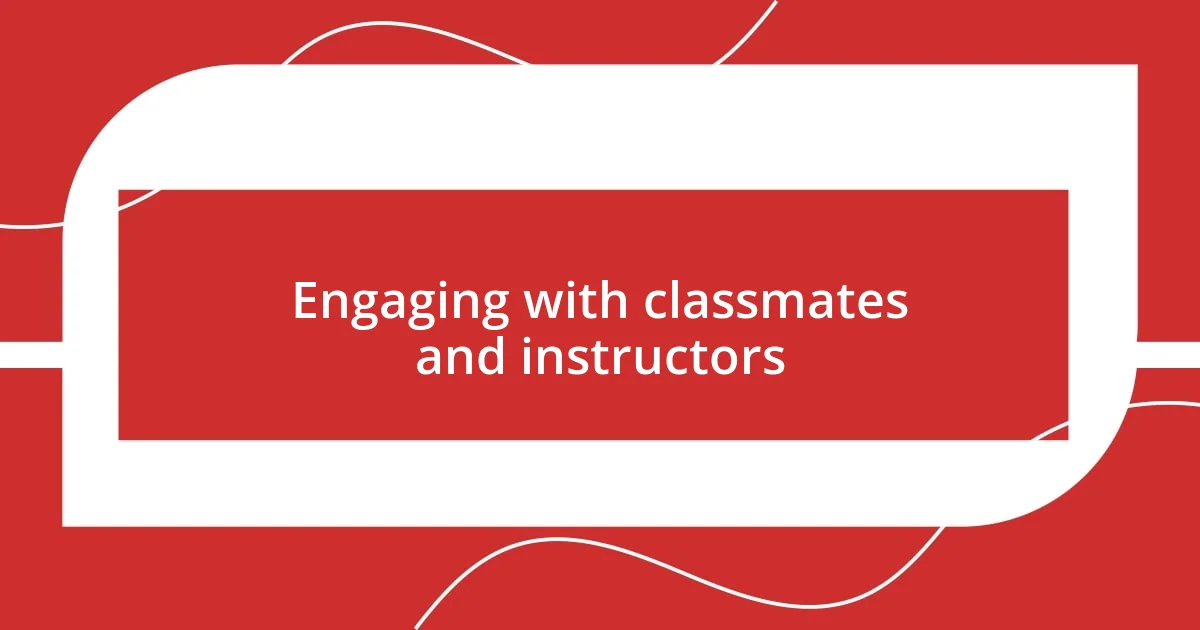
Engaging with classmates and instructors
Engaging with classmates and instructors transforms the learning experience in music classes profoundly. I fondly remember the day I was too shy to share my original song in front of my peers. When my instructor encouraged me, I could feel the warmth radiate from my classmates. Their supportive nods and smiles made me realize that vulnerability fosters connection, enriching the atmosphere of creativity. Have you ever held back from sharing? It can be a game-changer when you take that leap.
Interactions in the classroom aren’t just about feedback; they can be incredibly uplifting. I often found myself sharing tips on guitar techniques with classmates who were struggling as I had once done. In those moments, I felt a sense of community and camaraderie that taught me more than any textbook ever could. The encouragement from my peers fueled my motivation and shaped my confidence. Have you ever helped a friend in their learning journey? It’s gratifying to give back, isn’t it?
Instructors play a pivotal role too. I recall a particular lesson where my instructor shared a personal story about her early struggles with performance anxiety. That moment felt like a revelation. It was reassuring to know that even seasoned musicians experience challenges. This candidness fostered an environment where we could openly discuss our fears and aspirations. It made me wonder—what could I achieve if I embraced vulnerability in my own journey?
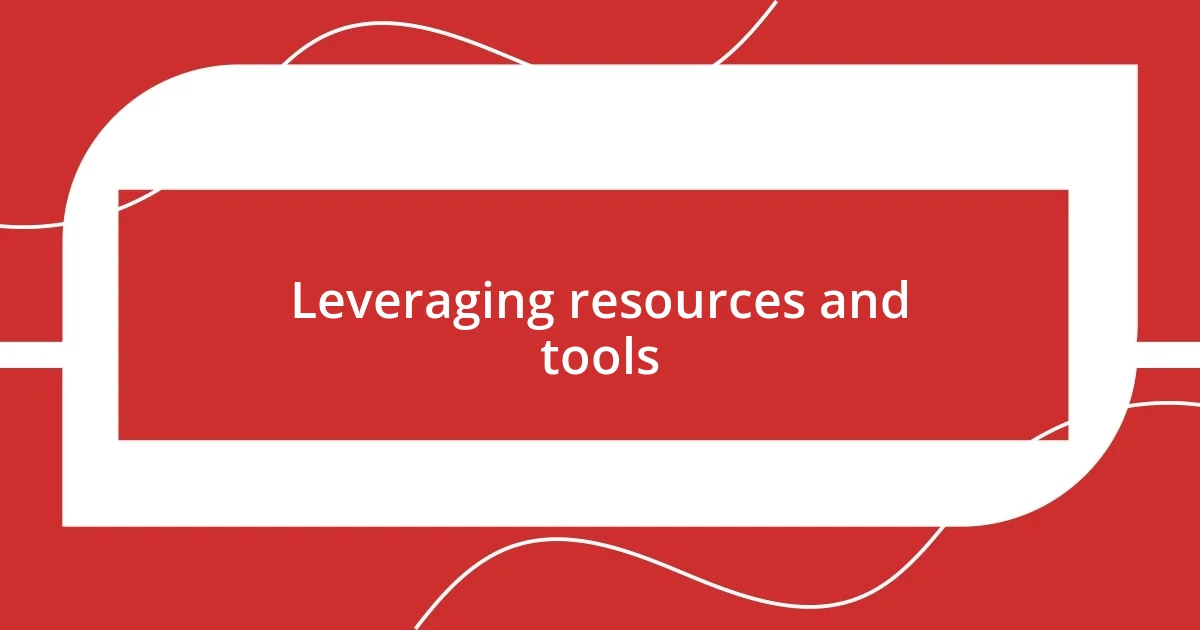
Leveraging resources and tools
Leveraging resources and tools in music classes can significantly enhance your learning experience. I discovered this firsthand when I started utilizing online platforms like YouTube for tutorials. I remember stumbling upon a video that broke down a complex piece I was struggling with. Watching step-by-step instructions changed everything for me. Have you ever considered how a simple video could clarify a challenging concept?
I also found that using apps designed for musicians was a game-changer in refining my skills. For example, there’s this metronome app that not only helped me keep time but also had features for practicing along with backing tracks. The moment I synced my playing with those tracks, I felt the music come alive in ways I hadn’t anticipated. It made me wonder—how many other tools are out there that could elevate your practice sessions?
Another key resource I leveraged was the wealth of sheet music available online. When I needed to expand my repertoire, I turned to websites that offered a variety of compositions for all skill levels. I ended up finding my favorite pieces to perform, which reignited my passion for playing. Have you explored the vast resources online? The right tools could lead you to discover new joys in your musical journey.
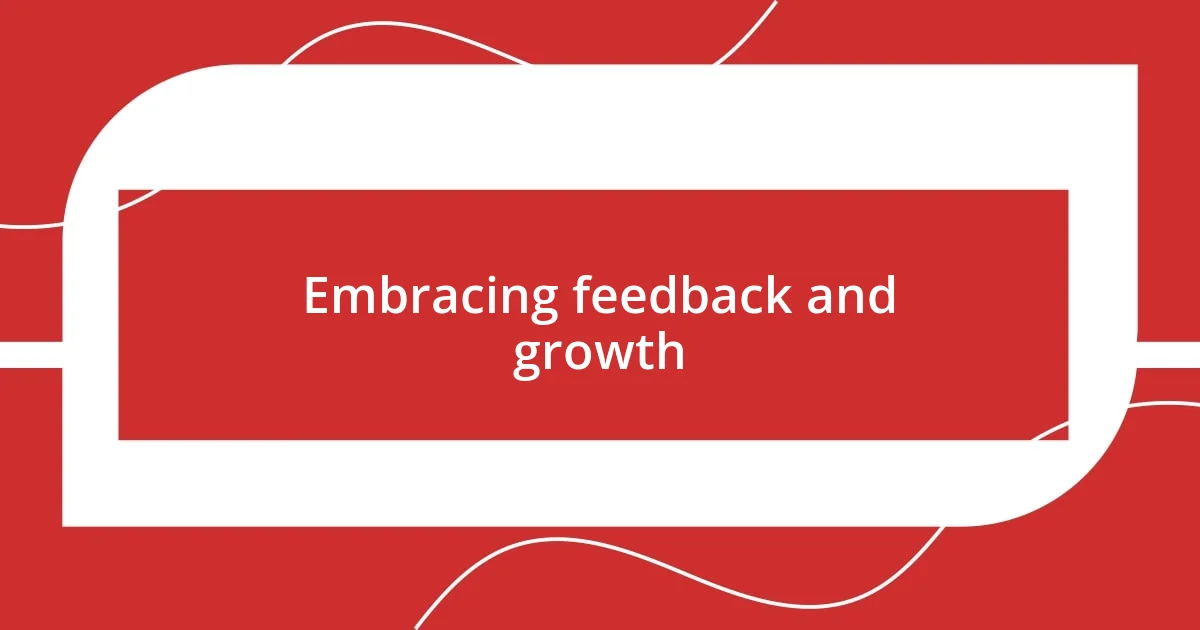
Embracing feedback and growth
Embracing feedback is crucial for growth in music classes. I remember feeling nervous after sharing my composition for the first time. The constructive criticism from my classmates didn’t feel like judgment; instead, it was a path leading me to better my skills. Have you ever experienced the shift from fear to gratitude when someone offered insights that sparked new ideas?
Growth often flourishes in the environment created by open feedback. I still cherish the moment when my instructor pointed out a small but vital technique that transformed my performance drastically. It was like a lightbulb went off, illuminating a previously unseen potential within me. This kind of transformation makes you wonder—what hidden gems could you discover if you also leaned into the process of receiving feedback?
What I learned is that embracing constructive criticism builds resilience and stimulates creativity. After every performance, I made it a habit to ask for feedback, even when it felt daunting. This practice not only honed my skills but also taught me the importance of having a growth mindset. Have you ever thought about how embracing feedback can reshape your journey? Through this approach, I found not just improvements in my music, but also an enriching layer to my artistic identity.
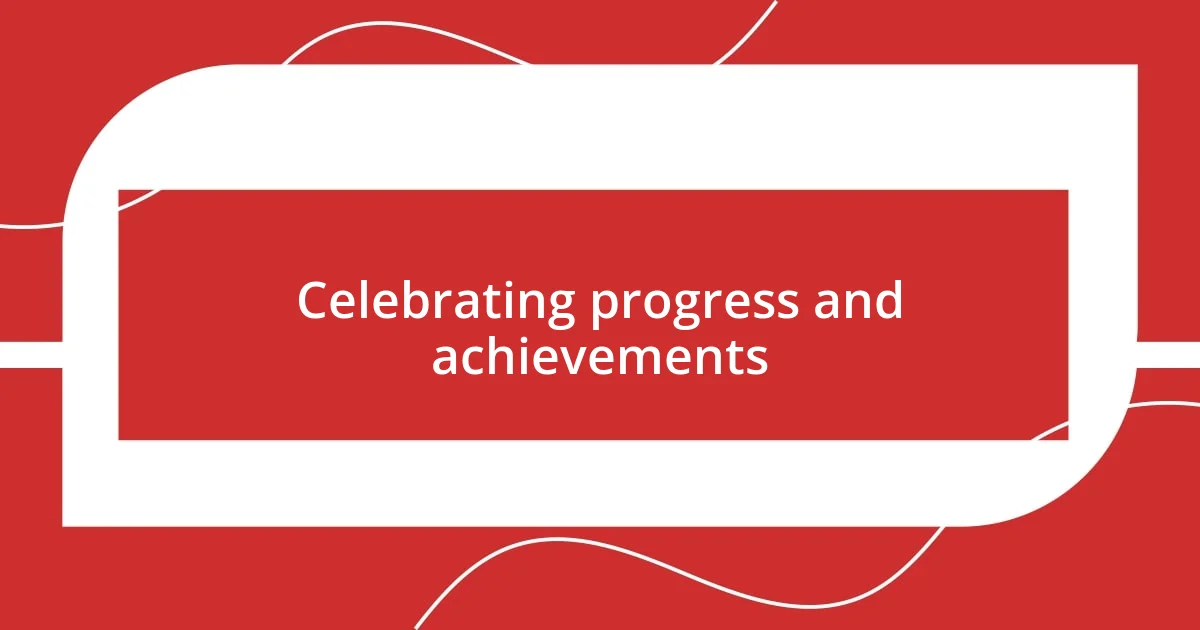
Celebrating progress and achievements
Celebrating progress and achievements in music classes can be incredibly fulfilling. I remember the exhilaration I felt after mastering a challenging piece. Performing it in front of my classmates not only gave me a rush but also highlighted how far I’d come in my musical journey. Have you ever experienced that moment when your hard work truly pays off?
One particular instance stands out in my memory. I had set a personal goal of learning a new scale every week. After weeks of consistent practice, I could play them fluidly and even integrate them into spontaneous jam sessions! Each small win was like adding another layer to my confidence. Isn’t it remarkable how little victories can snowball into a robust sense of accomplishment?
In my experience, sharing these milestones with my peers transformed ordinary classes into moments of celebration. I recall organizing a mini-recital where everyone showcased their progress. The room was electric with pride and joy; it reinforced the notion that success is sweeter when shared. So, how do you celebrate your musical achievements? Embracing these moments is vital because they remind us of the joy in our hard-earned growth.

